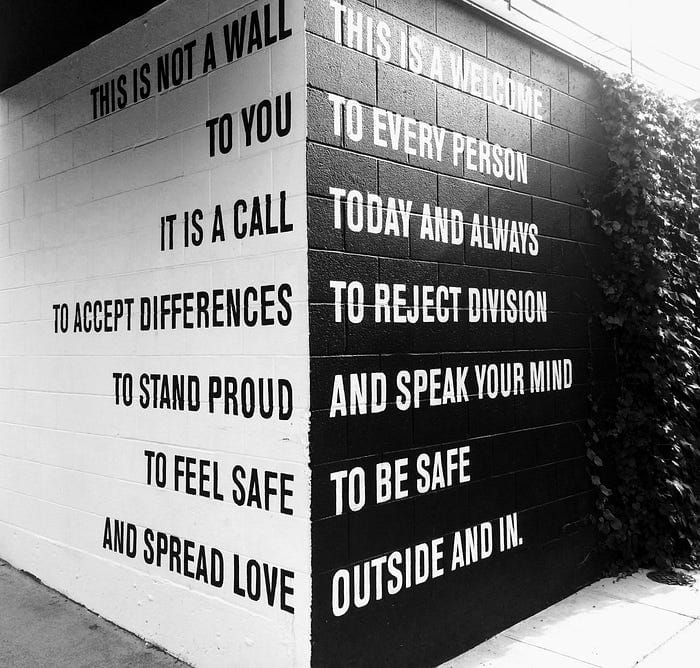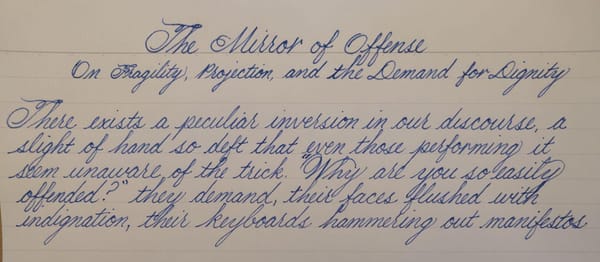Deconstructing the Victim Narrative in 'Derogatory Name-Calling Aimed at Gender-Critical Parents'
The Inconvenient Truth about playing the victim

The article "Derogatory Name-Calling Aimed at Gender-Critical Parents" from pittparents.com as authored by “EyesOpen”1 presents a troubling narrative that demands closer scrutiny. The central argument of the piece is that "gender-critical" parents are being unfairly attacked and disparaged for simply expressing their beliefs and concerns about their children's gender identity. However, this framing is as disingenuous as it is dangerous, as it ignores the harmful assumptions and biases underlying the "gender-critical" position and the real-world consequences it has for transgender individuals and their families.
It is hypocritical for "gender-critical" advocates to complain about the social and professional consequences of their actions, such as being called out for discriminatory speech and behavior or facing disciplinary action for promoting discriminatory views or behaviors. These consequences are not unfair attacks, but rather the natural consequence of promoting ideas that are harmful and contrary to the values of equality and inclusion. No one chooses to be trans, but everyone chooses how they behave to a suspected (or out) trans person.
At its core, the "gender-critical" movement relies on a tactic that is all too familiar to those who study hate groups and extremist ideologies: the fallacy of "just asking questions." By presenting their ideas as reasonable concerns or legitimate inquiries, "gender-critical" advocates attempt to shield themselves from criticism and accountability. This is a strategy straight out of the playbook of groups like the KKK, Proud Boys, and various anti-LGBTQ+ organizations, who use similar rhetoric to mask their hateful and discriminatory beliefs2.
But let's be clear: the ideas promoted by the "gender-critical" movement are not harmless opinions or innocent questions. They are based on fundamental misconceptions about gender identity and contribute to the marginalization, discrimination, and oppression of transgender individuals. Numerous studies have documented the negative impacts of rejection, lack of support, and exposure to transphobic attitudes on the mental health and well-being of transgender youth34. By perpetuating these harmful beliefs, "gender-critical" parents are not just expressing their thoughts—they are actively harming their children.
This raises a crucial point about the limits of tolerance and the need to hold harmful ideas accountable. In his book "The Open Society and Its Enemies," philosopher Karl Popper argues that unlimited tolerance can lead to the destruction of tolerance itself. He suggests that if a society is tolerant without limit, even towards those who are intolerant, then the tolerant members of that society will eventually be destroyed or suppressed by the intolerant ones. This idea, known as the paradox of tolerance, highlights the importance of setting boundaries and challenging ideas that promote harm and discrimination.5
While freedom of belief and expression are fundamental rights, they do not extend to ideas that undermine the basic rights and dignity of others. Just as we condemn racist, sexist, or homophobic beliefs, we must also challenge transphobic attitudes wherever they appear, even when they come from parents or family members. Failing to do so not only harms transgender individuals but also erodes the very foundations of an open and inclusive society
This is not an attack on parents or an attempt to silence their concerns. It is a defense of their children's well-being and a call for a more honest and accountable dialogue about gender identity. As I have written in my article on indoctrination, the "gender-critical" movement relies heavily on tactics of manipulation, fear-mongering, and the suppression of dissent to maintain its influence6. By creating echo chambers that reinforce a singular, harmful narrative and punish those who question it, these groups prevent parents from accessing accurate information and support.
Challenging these tactics and holding harmful ideas accountable is not easy, but it is necessary. Throughout history, social movements like the Civil Rights Movement and the Gay Rights Movement have relied on the power of social pressure and collective action to create change and promote equality. By speaking out against transphobia and demanding better for transgender individuals and their families, we can continue this legacy of progress. Trans rights really do promote human rights.
At the same time, it is crucial to approach these conversations with empathy and understanding. Many parents who are drawn to "gender-critical" ideas are motivated by fear, confusion, and a desire to protect their children. They may be struggling to come to terms with their child's identity and in need of support and resources to navigate this process. By providing accurate information, connecting them with affirming communities, and modeling acceptance and love, we can help these parents overcome their biases and become allies to their transgender children. We must offer a helping, supportive hand to all parents, lest they fall into the known flaw of human reasoning: confirmation bias. This is what those echo chambers and indoctrination factories like pittparents.com prey upon. They crank out the content specifically to draw parents in who just have a hard time believing or accepting transgender, or even LGBTQ+ folks in general.
Ultimately, the "victim" narrative promoted by the pittparents.com article is a dangerous distraction from the real harms caused by "gender-critical" beliefs. It is an attempt to shield these ideas from criticism and accountability, while perpetuating the very discrimination and marginalization that transgender individuals face every day. As advocates for equality and justice, we must not let this narrative go unchallenged.
Instead, we must continue to stand up against hate and discrimination in all its forms, even when it comes from those closest to us. We must prioritize the voices and experiences of transgender individuals and their families, and work towards creating a society where every person can live authentically and with dignity. This is not an easy task, but it is a necessary one—for the sake of our children, our communities, and our shared future.
So if you find yourself the receiving end of one of the names from the list, or if you find yourself having disciplinary action take against you due to your outspoken behaviors, then maybe you should stop and think about that for a bit and consider, that maybe you are not the victim, but the victimizer.
EyesOpen."Derogatory Name-Calling Aimed at Gender-Critical Parents" 2024-06-13. Availble from pittparents.com. https://www.pittparents.com/p/derogatory-name-calling-aimed-at ↩
Southern Poverty Law Center. (2021). Extremist Files: Groups. https://www.splcenter.org/fighting-hate/extremist-files/groups ↩
J. Navarro, F. Johnstone, J. Temple Newhook, M. Smith, j Wallace Skelton, K. Prempeh, L. S., C. Lopez, A. Scheim, G. Bauer, on behalf of the Trans PULSE Canada Team. Health and well-being among trans and non-binary youth. 2021-06-25. Available from: https://transpulsecanada.ca/research-type/reports ↩
The Trevor Project. (2021). National Survey on LGBTQ Youth Mental Health 2021. https://www.thetrevorproject.org/survey-2021/ ↩
Popper, K. (1945). The Open Society and Its Enemies. Routledge. ↩
Pitt. The inconvenient truth about indoctrination. People with Inconvenient Truths about Transphobes [PITT]. Published August 2, 2024. https://pittpeople.substack.com/p/the-inconvenient-truth-about-indoctrination?r=3khofc ↩


